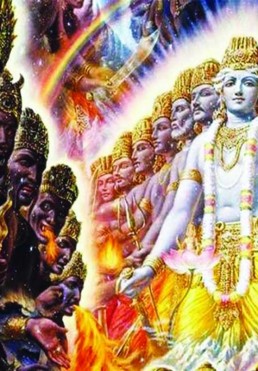Gita Chapter 16 – Verse 23 « »
यः शास्त्रविधिमुत्सृज्य वर्तते कामकारतः ।
न स सिद्धिमवाप्नोति न सुखं न परां गतिम् ॥ १६-२३॥
yaḥ śāstravidhimutsṛjya vartate kāmakārataḥ
na sa siddhimavāpnoti na sukhaṃ na parāṃ gatim 16-23
He who, having cast aside the ordinance of the scriptures, acts under the impulse of desire, attains neither perfection, nor happiness, nor the Supreme Goal.
yaḥ = anyone who; śāstravidhiṃ = the regulations of the scriptures; utsṛjya = giving up; vartate = remains; kāmakārataḥ = acting whimsically in lust; na = never; saḥ = he; siddhiṃ = perfection; avāpnoti = achieves; na = never; sukhaṃ = happiness; na = never; parāṃ = the supreme; gatiṃ = perfectional stage.;

